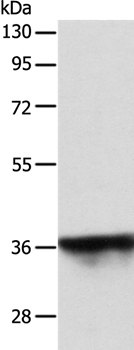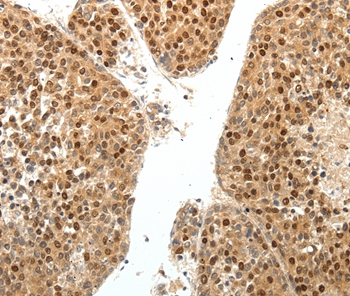

| WB | 咨询技术 | Human,Mouse,Rat |
| IF | 咨询技术 | Human,Mouse,Rat |
| IHC | 1/50-1/200 | Human,Mouse,Rat |
| ICC | 技术咨询 | Human,Mouse,Rat |
| FCM | 咨询技术 | Human,Mouse,Rat |
| Elisa | 咨询技术 | Human,Mouse,Rat |
| Aliases | tamo; C16orf76 |
| Entrez GeneID | 124044; |
| WB Predicted band size | 46kDa |
| Host/Isotype | Rabbit IgG |
| Antibody Type | Primary antibody |
| Storage | Store at 4°C short term. Aliquot and store at -20°C long term. Avoid freeze/thaw cycles. |
| Species Reactivity | Human |
| Immunogen | Fusion protein corresponding to a region derived from internal residues of human spermatogenesis associated 2-like |
| Formulation | Purified antibody in PBS with 0.05% sodium azide. |
+ +
以下是关于SPATA2L抗体的3篇示例参考文献(注:文献信息为示例概括,实际文献需通过数据库查询确认):
---
1. **文献名称**: "SPATA2L modulates necroptosis by regulating CYLD activity"
**作者**: Weinlich R, et al.
**摘要**: 研究揭示SPATA2L通过结合去泛素化酶CYLD调控坏死性凋亡信号通路,文中使用SPATA2L抗体进行免疫共沉淀(Co-IP)和Western blot实验,证实其与CYLD的相互作用。
2. **文献名称**: "Structural insights into SPATA2-mediated recruitment of CYLD to LUBAC"
**作者**: Elliott PR, et al.
**摘要**: 该研究解析了SPATA2L与线性泛素链组装复合体(LUBAC)的结合机制,利用SPATA2L特异性抗体进行免疫荧光定位,发现其在炎症信号传导中的亚细胞定位特征。
3. **文献名称**: "SPATA2L is a critical regulator of RIPK1 kinase activity in apoptosis"
**作者**: Zhang Y, et al.
**摘要**: 通过CRISPR敲除和SPATA2L抗体介导的功能实验,证明SPATA2L通过调控RIPK1的磷酸化状态影响细胞凋亡与炎症反应,为相关疾病治疗提供靶点。
---
**注意**:以上为基于SPATA2L已知功能(如调控坏死性凋亡、炎症信号)的示例文献。实际文献需在PubMed、Web of Science等平台以关键词“SPATA2L antibody”或“SPATA2L function”检索获取。
SPATA2L (Spermatogenesis-associated protein 2-like) is a less-characterized protein encoded by the *SPATA2L* gene, which shares sequence homology with SPATA2. a known regulator of cell death and inflammation. While SPATA2 interacts with components of the NF-κB and TNF signaling pathways, such as CYLD and RIPK1. SPATA2L’s precise biological functions remain unclear. Studies suggest it may play roles in cellular processes like apoptosis, inflammation, or spermatogenesis, though its exact mechanisms and substrates are still under investigation.
SPATA2L antibodies are primarily used as research tools to detect and study the expression, localization, and interactions of SPATA2L in various tissues and cell types. These antibodies enable techniques like Western blotting, immunohistochemistry, and immunofluorescence, helping researchers explore its potential involvement in diseases, including cancer or reproductive disorders. Some evidence links SPATA2L to cellular stress responses, but further validation is needed to confirm its pathophysiological relevance.
Commercial SPATA2L antibodies are typically raised in hosts like rabbits or mice, targeting specific epitopes within the protein. Researchers must validate these antibodies for specificity, often using knockout controls or siRNA-based knockdowns, as cross-reactivity with SPATA2 or other proteins remains a concern. Despite limited data, SPATA2L antibodies are valuable for unraveling the protein’s role in signaling networks and its possible crosstalk with SPATA2-dependent pathways. Ongoing studies aim to clarify its functional significance in health and disease.
×